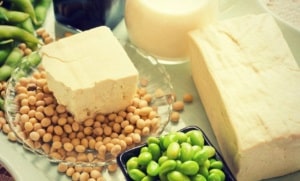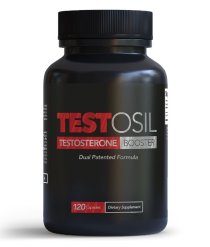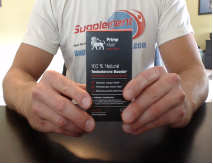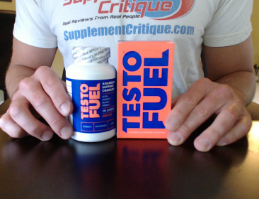Phytoestrogens and Testosterone: Will I Grow Boobs With This?
By: Rob Miller
For women, it’s a buzz word linked to cancer.
For men, the word is associated with the threat of low testosterone.
Phytoestrogens are one of the most misunderstood compounds in nutrition.
Found in different plant-based foods, phytoestrogens have been the subject of a variety of studies on menopause, cancer, hormone health, and overall health. The results? Some good.
Some bad.
Are phytoestrogens the scary testosterone killer and cancer causer that they are made out to be?
Or could they an important way to naturally improve your health?
What are Phytoestrogens?
 As the name implies, phytoestrogens are estrogenic compounds found within specific plant-based foods.
As the name implies, phytoestrogens are estrogenic compounds found within specific plant-based foods.
The most notable example of a food that contains phytoestrogens is soy.
Estrogen is a sex hormone found in both sexes but primarily in women. It is the reason that a woman’s reproductive system develops along with feminine characteristics such as wider hips, larger breasts, and pubic hair.
Estrogen is also important for female bodily processes such as the menstrual cycle.
Related article: How To Increase Testosterone Naturally: The ULTIMATE Guide | Supplement Critique
With that said, it’s important to understand that phytoestrogens are not the exact same as the estrogen found in a female’s hormonal system.
When you eat soy, you’re not directly eating estrogen. Rather, phytoestrogens are similar to estrogen and estrogenic metabolites in a structural and functional way.
Phytoestrogens interact with estrogen receptors in the body but not nearly to the extent of actual estrogen. Estrogen is an extremely potent sex hormone whereas phytoestrogens have been said to have up to 1/1000th the strength of estrogen. In other words, you would need to ingest a crazy amount of phytoestrogens to get the same reaction that a tiny amount of estrogen would trigger.
The reason I mention the strength of phytoestrogens is to alleviate any worry or confusion about them that guys might have.
Yes, there are good and bad phytoestrogens but eating an apple and drinking a hoppy beer isn’t going to turn you into a woman.
I’ll talk more about phytoestrogens and testosterone below.
Examples of Phytoestrogens
Below are the most common examples of phytoestrogens in the popular Western diet:
Whole Food
- Soybeans
- Hops
- Wild Yam
- Oats
- Apples
- Flax seed
- Royal Jelly
- Lentils
- Grains
- Carrots
Herbal & Supplements
- Red Clover
- Dong Quai
- Licorice root
- Ginseng
- Vitex
- Rehmannia
- Black Cohosh
- Maca
- Tribulus (Tribulus terrestris)
- Fo-ti
- Resveratrol
Benefits of Phytoestrogens
Phytoestrogens and Cancer Risk
The isoflavones found in phytoestrogens with an emphasis on natural soy such as the soy bean have been suggested to lower the risk of prostate cancer development and progression.
For women who have already experienced menopause, phytoestrogens may help to prevent breast cancer.
One study found that post-menopausal women who followed a diet rich in phytoestrogens had a significant decrease in their risk of death related to breast cancer. (1-2)
Blood Pressure
Resveratrol is found in small amounts in red wine and it’s a common phytoestrogen. Taking it in extract form may help to decrease high blood pressure.
A study published in Clinical Nutrition demonstrated that 150 mg per day of resveratrol extract was effective in lowering systolic blood pressure. (3)
Weight Loss
While more studies are needed to confirm the mechanisms behind the phytoestrogen, genistein, it has been suggested that this compound may help to regulate weight gain.
By limiting a number of adiposity-linked enzymes, this phytoestrogen may promote a healthy weight management. (4)
Phytoestrogens and Testosterone
The question that is on the mind of all the guys reading this would be, “If I eat foods that contain phytoestrogens, will my testosterone decrease?”
The answer is that it depends on the type of phytoestrogen you are consuming.
Natural phytoestrogens found in fresh fruits, vegetables, and herbs have been shown not to impact testosterone levels in men. (5)
Heavily processed phytoestrogens such as processed soy that have been treated with pesticides may negatively impact the available testosterone in men. A popular example of processed soy would be those fake chicken nuggets that you find in commercial grocery stores.
Want to know other foods that will lower testosterone?
Click here for a full list of foods that may kill your testosterone.
What about male infertility?
If testosterone levels aren’t affected, there’s a still a chance that all those phytoestrogens can wreak havoc on a man’s libido and ability to have children, right?
According to several studies, the answer is no.
Studies confirm that phytoestrogens play no part in making a man any less fertile. (6)
Potential Side Effects and Toxicity
Phytoestrogens can help with cardiovascular health including blood pressure, heart disease, and weight loss. Sounds good, right?
Does that mean you should begin following a strictly phytoestrogen diet?
Not so fast.
As I alluded to above, there are many phytoestrogens that can benefit your health, regardless if you’re a man or woman.
With that said, there are some phytoestrogens that can cause adverse complications if consumed.
You want to avoid processed and synthetic phytoestrogens.
Processed Phytoestrogens
Processed phytoestrogens are present in boxed, canned, or packaged goods.
The worst culprits are processed soy such as tofu and fake-meats along with sugar-loaded fruit juices.
Synthetic Phytoestrogens
As for synthetic phytoestrogens, you find these in your home and you don’t even know it.
These are within synthetic-based products such as plastics and cleaners.
When you can, choose plastic options that are free from BPA (bisphenol A).
Studies suggest that these environmental estrogens may impact hormone health and elevate your risk for cancer.
Outside of processed and synthetic phytoestrogens, is there such a thing as consuming too many natural phytoestrogens?
Cognitive Health
While studies are conflicting, it’s worthwhile to mention that a diet high in phytoestrogens may be linked to poor cognitive health.
A study published in The Journal of Steroid Biochemistry and Molecular Biology concludes that we cannot immediately assume all phytoestrogens are going to negatively impact health but rather some phytoestrogens may become problematic based on your body’s ability to break them down into their bioactive metabolites.
In other words, the link between phytoestrogens and poor cognitive health may be on a case-by-case basis and should not be looked upon as the norm. (7)
How to use Phytoestrogens
Many of the phytoestrogen supplements that you will find come in blends.
Below, you’ll find the best ingredients to look for in a phytoestrogen supplement with the suggested dosages that are deemed safe for most people.
- Red Clover (160 mg per day)
- Dong Quai (1,000 mg per day)
- Ginseng (1,000 to 2,000 mg per day)
- Black Cohosh (50 mg per day)
- Maca (3,000 mg per day)
- Tribulus terrestris (500 mg per day)
- Resveratrol (150 mg per day)
How To Cycle Phytoestrogens
To best judge the effect of different phytoestrogens on the body, I’d recommend going through one month of a phytoestrogen supplement then cycling off of it for 2 to 4 weeks.
Access the benefits and how you’re feeling before beginning a different phytoestrogen or another cycle of the same brand.
Where To Buy
Here are a few different options to choose from with selected phytoestrogens. (none of these are affiliate links)
- Solaray – Phytoestrogen
- Essential Living Foods Organic Vitality Smoothie
- Vital Nutrition Pure Resveratrol
Conclusion
Overall, studies agree that natural phytoestrogens from whole foods are harmless and will not negatively impact your health. The phytoestrogens that you have to watch out for are those that are processed or used as a synthetic material.
If you’re worried about your cardiovascular health and risk for certain diseases, it may be worthwhile to have a chat with your doctor or certified nutritionist about phytoestrogen diets and supplements.
References
- van Die MD, Bone KM, Williams SG, Pirotta MV.
Soy and soy isoflavones in prostate cancer: a systematic review and meta-analysis of randomized controlled trials.
BJU Int. 2014 May;113(5b):E119-30. doi: 10.1111/bju.12435. - Shu XO, Zheng Y, Cai H, Gu K, Chen Z, Zheng W, Lu W.
Soy food intake and breast cancer survival.
JAMA. 2009 Dec 9;302(22):2437-43. doi: 10.1001/jama.2009.1783. - Liu Y, Ma W, Zhang P, He S, Huang D.
Effect of resveratrol on blood pressure: a meta-analysis of randomized controlled trials.
Clin Nutr. 2015 Feb;34(1):27-34. doi: 10.1016/j.clnu.2014.03.009. Epub 2014 Mar 31. - Dang ZC.
Dose-dependent effects of soy phyto-oestrogen genistein on adipocytes: mechanisms of action.
Obes Rev. 2009 May;10(3):342-9. doi: 10.1111/j.1467-789X.2008.00554.x.
Epub 2009 Jan 16. - Hamilton-Reeves JM, Vazquez G, Duval SJ, Phipps WR, Kurzer MS, Messina MJ.
Clinical studies show no effects of soy protein or isoflavones on reproductive hormones in men: results of a meta-analysis.
Fertil Steril. 2010 Aug;94(3):997-1007. doi: 10.1016/j.fertnstert.2009.04.038. Epub 2009 Jun 12. - Storgaard L, Bonde JP, Olsen J.
Male reproductive disorders in humans and prenatal indicators of estrogen exposure.
A review of published epidemiological studies.
Reprod Toxicol. 2006 Jan;21(1):4-15. Epub 2005 Jul - Soni M, White LR, Kridawati A, Bandelow S, Hogervorst E.
Phytoestrogen consumption and risk for cognitive decline and dementia: With consideration of thyroid status and other possible mediators.
J Steroid Biochem Mol Biol. 2016 Jun;160:67-77. doi: 10.1016/j.jsbmb.2015.10.024. Epub 2015 Nov 1. - Patisaul HB, Jefferson W. The pros and cons of phytoestrogens.
Frontiers in neuroendocrinology. 2010;31(4):400-419. doi:10.1016/j.yfrne.2010.03.003. - Jargin SV.
Soy and phytoestrogens: possible side effects.
GMS German Medical Science. 2014;12:Doc18. doi:10.3205/000203.
Top 3 Testosterone BoostersAffiliate Disclosure
Testosil is the most effective testosterone boosting supplement on the market that I’ve tested.
Prime Male is another very effective testosterone booster that uses clinically proven ingredients.
Testofuel is a VERY popular testosterone booster that contains ingredients to help older men.







